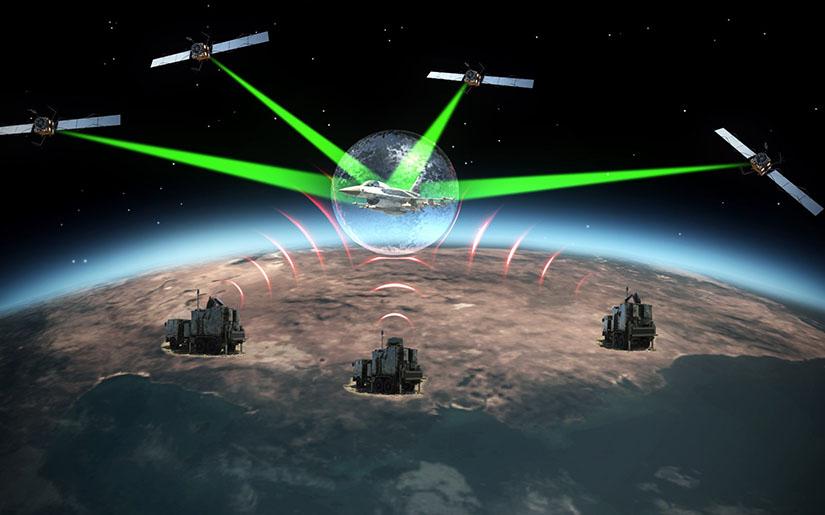The conflict between Israel and Iranian proxies in Gaza and Lebanon, which began on October 7, 2023, served as a wake up call to the vulnerability of GPS-based navigation systems in military operations. During this conflict, as both Hezbollah and Israel simultaneously disrupted GPS signals, the urgent need for autonomous systems to be resilient against such interference became apparent. As the Israeli Defense Forces (IDF), and militaries globally, continue to expand their use of autonomous systems, GPS immunity has become a top priority. Several Israeli companies have answered the call.
The Endless Cycle: GPS Threats And Responses
The GPS navigation system, operated by the U.S., uses a dedicated constellation of medium Earth orbit (MEO) satellites. Many autonomous systems rely on GPS. Yet GPS denial events have become commonplace across battlefields worldwide.
These GPS denial attacks can be accelerated when advanced Western weapon systems become available, by whatever means, to countries like Iran. This poses a significant threat, as it could expose vulnerabilities in GPS navigation systems.
Maj. General (ret.) Giora Eiland, a former head of the Israeli National Security Council, noted that when a country like Iran gains access, for example, to advanced U.S.-made weapon systems, it creates a danger of finding the weak spots of such systems. If Iran were to get its hands on the U.S.-made JDAM bomb, it could potentially exploit its GPS weaknesses using advanced jamming technologies developed by Russia.
Israeli defense sources pointed out that Iran has an impressive capability in reverse engineering, partly due to international sanctions that blocked the sale of advanced weapon systems to it. This is evident in the Iranian Shahed-191 drone, believed to be based on the design of the American-made RQ-170 Sentinel drone, which was brought down by Iran in 2011.
The same can be true of the converse, however. By analyzing the Russian GPS denial systems operated in Syria, Israel has taken steps to better prepare for more aggressive GPS denial scenarios. GPS denial incidents such as those recently caused by Russian forces in Syria, have accelerated the development of such systems designed to make military systems immune to such disruptions.
While most autonomous systems typically rely on GPS for navigation, they come equipped with backup inertial navigation systems (INS) to mitigate disruptions. Israeli-made weapon systems that use GPS as a guidance sensor also employ other methods that are immune to interference. Some of these systems are already operational, while others are undergoing testing.
This cat-and-mouse game of GPS denial measures and counter-measures seems neverending. Maj. General (ret.) Isaac Ben Israel, former head of the Israeli Air Force Operations Research Branch and Military R&D in the IDF, emphasized that, “In both GPS denial and immune systems, the question is which side is one step ahead of the other. Whichever side manages to be one step ahead, then its access to this technology is meaningful.”
Developing Anti-Jamming Solutions
Israel first suffered from Global Navigation Satellite System (GNSS) denial when Russian forces in Syria operated powerful jamming systems. The war in Ukraine has also created a wide area where GNSS signals cannot be trusted. GPS jamming is a global issue.
GPS Anti-Jamming systems protect against deliberate jamming and interference for GPS receivers. When the GPS signal reaches the Earth’s surface, it is feeble and can be overpowered by stronger radio frequency (RF) energy. An unprotected Code receiver can be interfered with by a tiny jammer with a power of around 10 Watts for up to 30 kilometers (line of sight).
The capability of armed forces to deny GPS/GNSS service has prompted countries to invest in technologies aimed at enabling their military forces to continue relying on GNSS-based navigation.
Israeli defense industries are aware of the problems GPS denial systems create and are developing counter-systems, while adding new sensors to advanced systems, mainly long-range missiles. These sensors are designed to operate in case the weapon system is affected by GPS denial. In such scenarios, other highly classified sensors or a mix of them are designed to guide the weapon systems to their targets with very high accuracy. Here are a few examples.
IAI: Anti-Jam Systems for Manned Aircraft
The proliferation of Russian-made GPS jamming systems in the Middle East has accelerated the process of equipping the Israeli Air Force’s (IAF) aircraft with anti-jamming systems. In 2021, the IAF revealed that advanced anti-jamming systems developed by Israel Aerospace Industries (IAI) had been integrated into advanced platforms used by its different squadrons.
IAI has over 20 years of proven experience in supplying a wide range of GNSS Anti-Jam solutions for the most demanding requirements and vast experience in integrating immune navigation solutions into airborne (manned and UAV), surface, maritime and guided munitions. It designed its ADA Anti-Jam GPS System to protect GPS and GNSS navigation from jamming.
According to IAI, the system has been integrated into advanced platforms used by the IAF, including F-16 fighter jets and various types of unmanned aerial systems (UAS). The ADA System has demonstrated operational maturity and is in use by a number of international customers on various airborne, land and marine platforms. IAI states that the ADA is combat-proven in providing immunity against GPS jammers.
IAI also continues to develop anti-GPS jamming systems. Recently, IAI unveiled the Compact ADA, a smaller version of the ADA system designed for tactical air platforms. The Compact ADA offers reduced size, weight, and power (SWaP) while maintaining advanced immunity capabilities. The Compact ADA is a derivative of the ADA system adapted to air tactical platforms, offering the benefits of advanced immunity capabilities in tactical platforms.
The ADA product portfolio, developed by IAI, is compatible with a broad range of GNSS’. Its state-of-the-art technology implements multiple mitigation methods and specialized digital signal processing algorithms. The system’s versatility facilitates integration into numerous platforms.
InfiniDome: EW Protection for UAVs

The Israeli company InfiniDome is launching a new system to deal with GPS denial technologies used widely around the world. The unmanned systems market is evolving rapidly, with many platforms across various industries relying on GNSS signals for positioning, navigation and timing (PNT).
In the defense sector, which leads the adoption of autonomous applications, and unmanned aerial vehicles (UAVs) in particular, the strategic approach has undergone a significant transformation. Today’s dynamic battlefield focuses on deploying fleets of smaller, faster, and more cost-effective UAVs that can be mass-produced and scaled for wide-reaching operations. However, this shift introduces a critical challenge: ensuring resilient navigation in the face of escalating electronic warfare (EW) threats that jeopardize GNSS reliability. As EW activity intensifies, particularly across Europe, the demand for compact and reliable GPS protection solutions has never been more critical.
InfiniDome will officially launch its new generation, GPSdome-SunStone, an anti-jamming module designed specifically for small UAVs and compact platforms. Weighing just 50g-100g, it offers critical protection against GNSS interference to ensure uninterrupted navigation, even in the most complex environments.
“Today’s UAV industry requires not only agility and scalability, but also robust navigation resiliency to operate effectively in contested environments,” said Omer Sharar, InfiniDome’s CEO. “With SunStone, we’ve created a solution that perfectly aligns with the new era of UAV strategy.”
According to InfiniDome, the launch of GPSdome-SunStone marks yet another milestone, following a series of significant achievements. These include: securing a major purchase with a customer in Western Europe, deploying its solutions across real-world jamming scenarios in conflict zones and successfully integrating into diverse platforms, including vessels, manned aerial photography aircraft and even Black Hawk helicopters, where they provided critical support to overcome interference-related take-off challenges.
“In recent years, we have seen how the future of navigation depends on reliable, flexible and proven anti-jamming solutions. We’ve also witnessed governments and militaries announce their aim to increase investment in the unmanned aerial vehicle market in 2025,” added Sharar.
“GPSdome-SunStone is not just another anti-jamming product—it’s a response to the growing demand for navigation resiliency in the face of evolving threats in the modern era,” Sharar explained. “Based on InfiniDome’s proprietary software-defined anti-jamming core, it doesn’t only protect from the most advanced threats today but is field-upgradeable to be able to face the most challenging threats tomorrow,” he said.
Cognata: GPS-Denied Navigation Using Digital Twins
Another Israeli company involved in developing GPS-resilience assets for autonomous military systems is Cognata. Systematic testing of autonomous vehicles (AVs) can be performed in sensor simulations or in the physical world. Physical tests offer real testing scenarios, and engineers can use actual vehicles instead of models. However, regulations restrict the use of these vehicles in cities. Thus, to perform tests with real AVs, one needs access to expensive hardware and field tests, which consume a considerable amount of time.
The Cognata tool is based on a digital twin of the real world, built using HD Maps, aerial photography, and other inputs that add to the reality of the simulation. Shay Rootman, Director of Business Development at Cognata, told Autonomy Global that the company added a feature to its simulation tool to enable developers and users of autonomous platforms to operate when GPS is denied. “We added the option to go to INS navigation to train the operator for these very likely events when GPS is dead,” he explained.
Preparing for a GPS-Denied Future
The Israeli defense forces and defense industries continue to remain deeply involved in developing different autonomous systems and, in parallel, ensuring these systems can continue their mission when GPS navigation is unavailable. This dual approach underscores the critical role of GPS in autonomous military systems and the ongoing race to stay ahead of adversaries in the realm of GPS denial and immunity.

